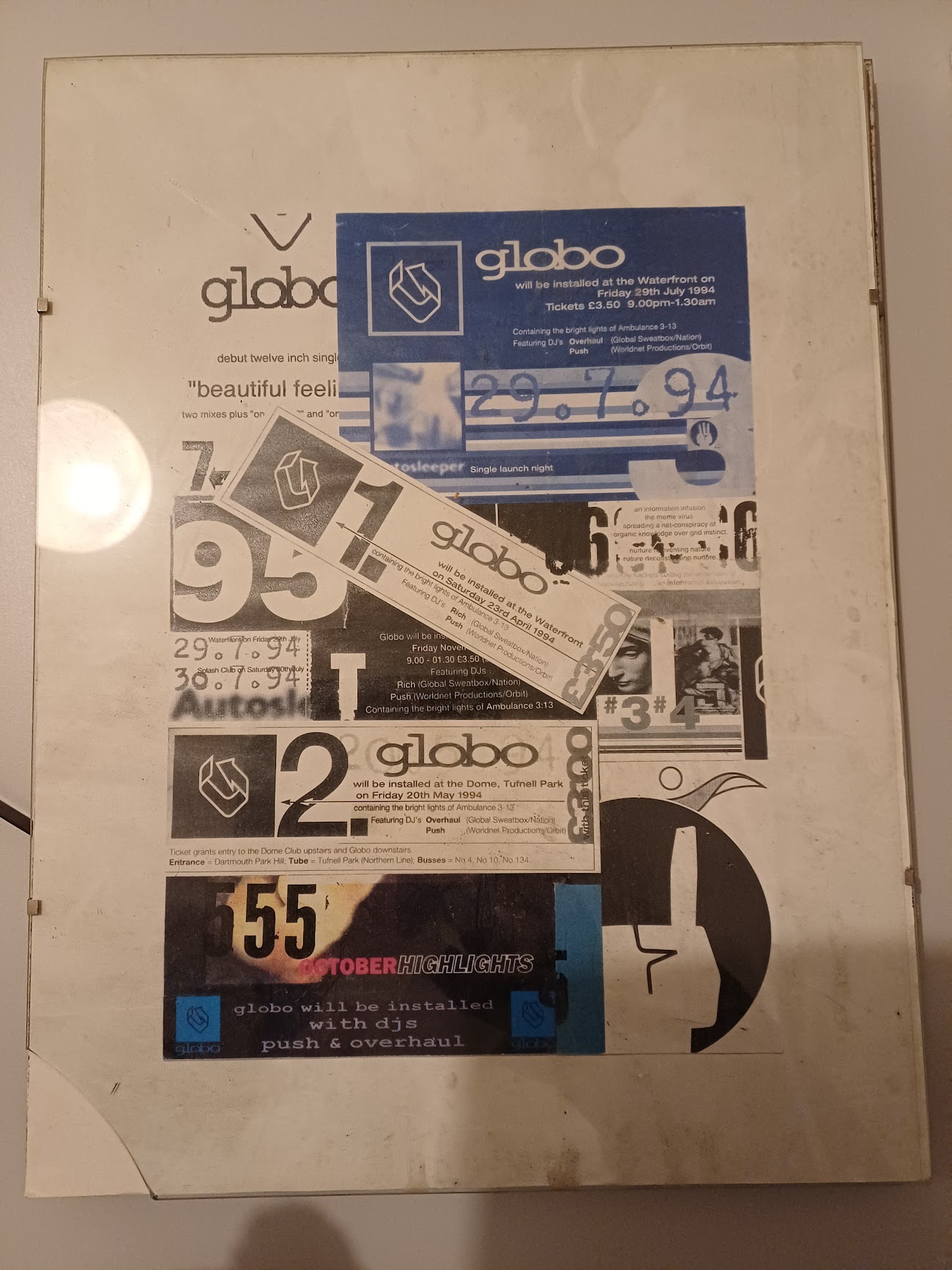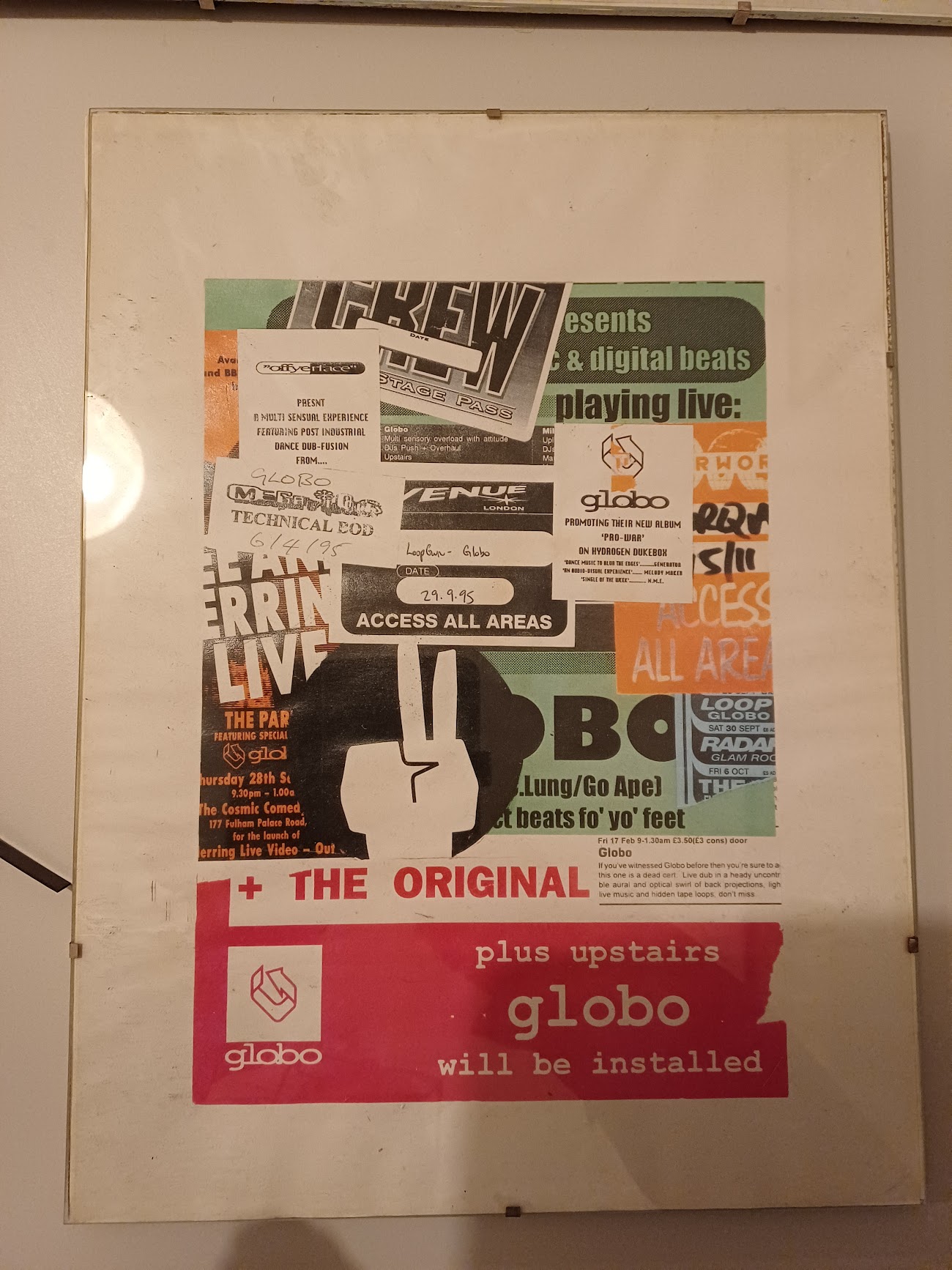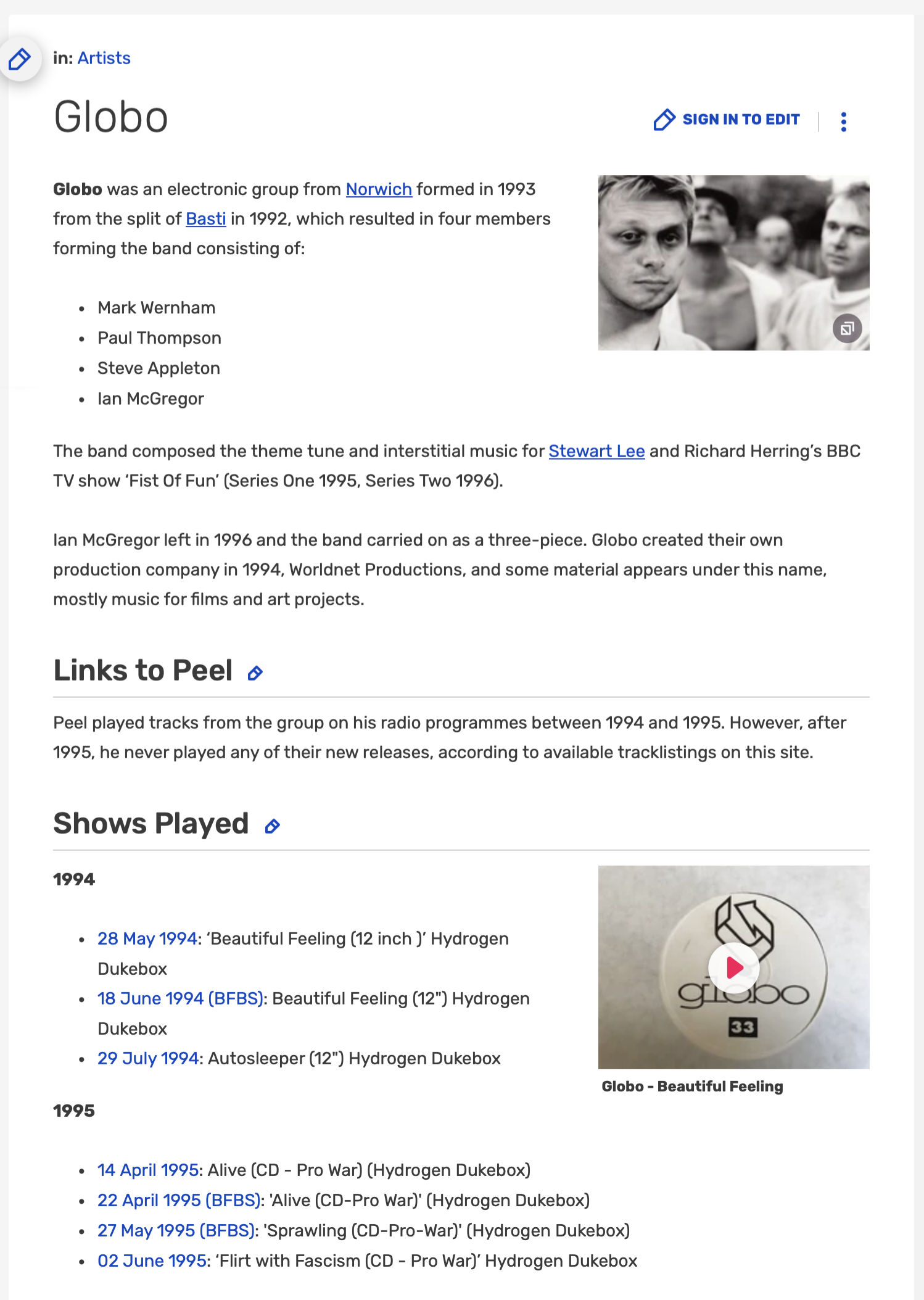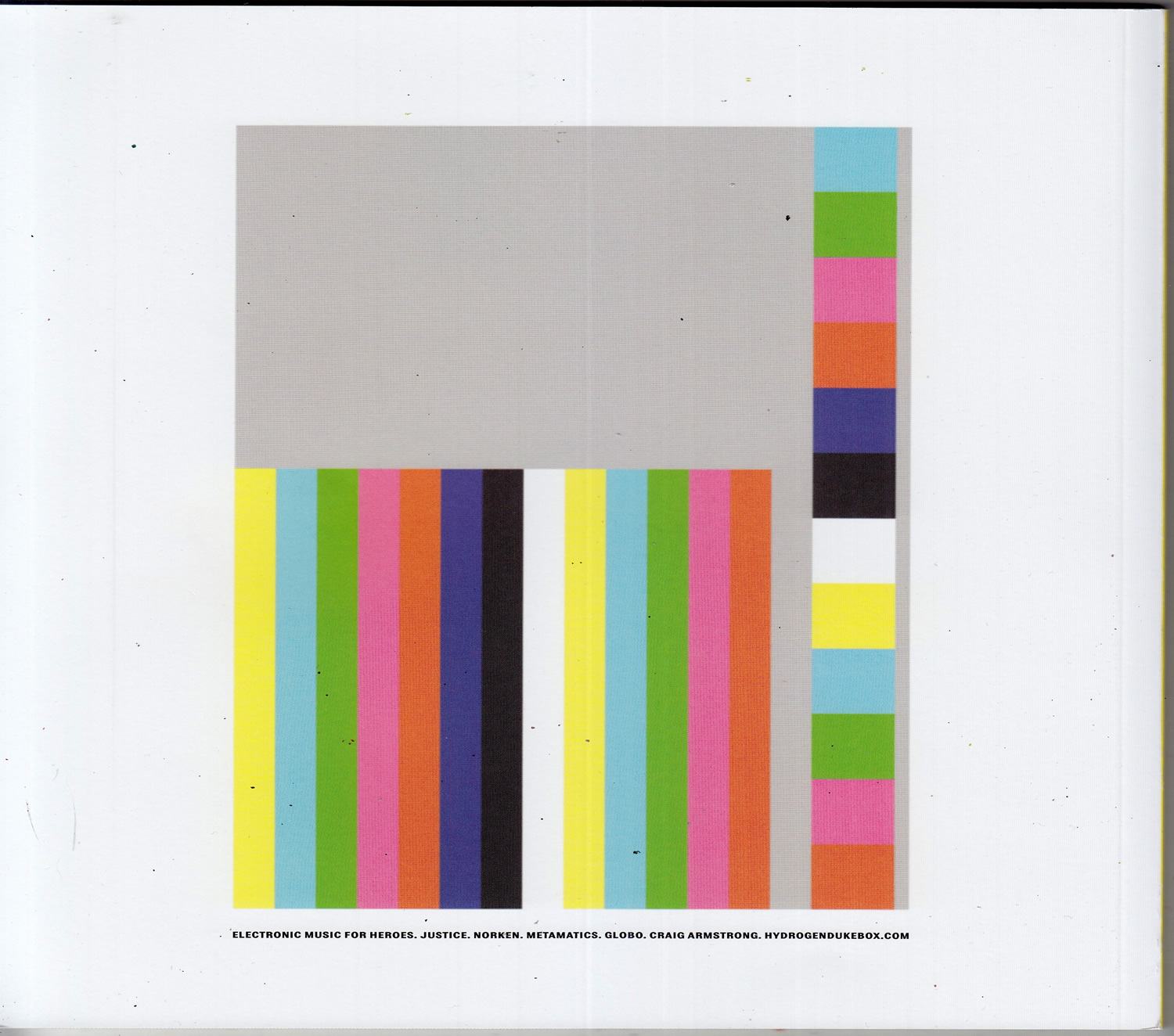BIOS
Paul Thompson.
A man whose telephone number is known to very few, and that’s
how he likes it. Paul came to music via an art training which left
him scarred. Vast outdoor installations and literal tryptichs of
his own penis won him few admirers.
Painting and bodybuilding are the only two activities which distract
him from the production of Globo’s music. A tacit six-footer, his
brooding, stiff persona is rarely seen outside of Globo’s studio,
and when it is, it exudes discomfort. Unhappy in the company of
the strangers and mistrustful of large gatherings having fun, Paul
is strangely at odds with pop music.
Favourite pastimes include taking acid before attending Premier
League football matches and lying.
Steve Appleton.
Perpetually shaven headed, quiet and bad-tempered, Steve again
has an art training, his chosen media being ink and more recently
sculpture. He rarely speaks, a fact most find disconcerting but
which suits his role in Worldnet Productions perfectly. He controls
the financial dealings of the company and has developed a special
relationship with bankers and lawyers. All cheques from Globo/Worldnet
Productions feature his stylish signature. His avowed intention
is to live in Euro Disney.
Mark Wernham.
Mark is apparently garrulous and often the spokesperson for Globo,
his media-friendly demeanour putting fanzine writers at ease. When
not writing some of the more trite melodies to be found in Globo’s
music, he is manipulating the information war and specifically
gathering data in a pro-pornography anti-censorship battle. He
is referred to as Wernham by his closest friends.
James Clayton.
BIO FOR DISTRIBUTORS
Globo formed in 1994 and with a deal from the underground dance
label Hydrogen Dukebox, set about recording the two singles which
emerged later that year. The debut, “Beautiful Feeling” was awarded
Melody Maker’s single of the week, garnered lavish praise and flew
into the independent top 30.
A second single, “Autosleeper”, revealed the bass-heavy dub drenching
tendencies of Globo, and became another Single Of The Week. Rare
live performances of the band, as part of their extravagant Club
Globo evenings, baffled and delighted crowds in equal measure,
with sumptious visuals and the now-famous information overload.
Not many people were sure what to make of the band drifting on
and off the stage, jamming with DJ’s, doodling in ambient interludes
and ripping into full-on dancefloor assaults.
With Globo’s debut album, “Pro-War” due for release, the provocative
four-piece are set to go super-nova. The band’s own radio show,
“Worldnet Wireless” will be airing around the country between April
and June, guerilla gigs are planned, the first of which will be
an appearance at Megatripolis (April 6 1995) and the band have
provided the theme music for BBC2’s new comedy series, “Fist Of
Fun” which commences broadcast on 31st March, 1995.
GLOBO
PRO-WAR
After two ecstatically well-received 12-inches in 1994, Globo
present their debut album, “Pro-War”.
Following on from the upbeat irony of “Beautiful Feeling” and the
dubby melody-drenched bass monster “Autosleeper”, “Pro-War” is
over an hour in the company of Globo’s swerving and unpredictable
musical meanderings.
Globo are no limp bedroom boffins with nothing to say. “Pro-War”
is junk-full of ideas, contradictions and evidence of the band’s
own adherence to their philosophy of using the telephone to pester
large organisations and discover fascinating new experiences. Check
out “Phone Fun” to hear Globo make contact with the Brazillian
television company, Globo TV.
“Sixties Nineties” is a genuine hymn to The Beatles and specifically
to John Lennon, as well as being a comment on the frustration of
exisiting in post-modern times.
Elsewhere, Globo return to their perrennial fixations; censorship
with the anthemic marching song “Ban Everything”, the soundtrack
to book-burnings and tabloid headlines, sex with “Cable Card” a
song which tells the story of a man who was hoodwinked by a fake
prostitute’s card left in phone box which led him to a religious
proselytiser and more sex with “Adult Channel”, music meant to
accompany thinking people’s pornography. “Intelligence Is Joy”
couldn’t be a more straightforward attack on hedonistic stupidity
while “Turn It Down Or Turn It Off” is the LP’s final blisteringly
fast pay-off
Undermining, subversive and pro-choice, “Pro-War” aims to provoke
and seduce in equal measure.
THIS IS LONDON 1966
Our new album: some things whch may help you in your listening
pleasure.
This is not techno
This is not dance music
This is not rock ‘n’ roll
This is the kamakaze
This is the tempest
This is the one way trip
WARNING!
Globo has failed to make an album generically dictated
YOU MAY FIND IT CONFUSING AND FEEL A SENSE OF DIORIENTATION
This is normal and will soon pass.
The following may help:
1) Try to listen to the words in the songs. They include important
information as to the purpose of the music’s existence.
2) Try to glean pleasure from the melodies in isolation from the
other elements
u S.
3) If you believe Globo to be the harbingers of the new, then
it will be true.
4) Pleasure is not a crime.
INDEPENDENT MUSIC ENTHUSIAST
After two singles, both Singles Of The Week in Melody Maker, and
the well-received and provocative debut album, “Pro-War”, Globo
found the latter part of 1995 heavy going. The band’s third single,
“Thirteen”, came close to landing the band in prison due to its
use of a genuine police interview tape with a murder suspect. The
track had to be hastily withdrawn and replaced with a censored
version. This was rapidly followed by the band’s drummer and visuals
co-ordinator, Ian McGregor leaving the band at the end of 1995.
Changing labels from the nascent and hip Hydrogen Dukebox to North
South Records took a while longer, but now arch manipulators and
underground dance lords Globo are back with a new single, “Independent
Music Enthusiast”.
As ever with Globo, discerning the real meaning behind the track
remains an impossible task. It could be read as a damning put-down
of Brit-Pop, of anal record collectors who scour record fairs for
Sonic Youth bootlegs. On the other hand, Globo are British, and
they claim they are a pop band. They may also rate “Daydream Nation”
as one of the best albums of the Eighties.
In a rare lyric, Globo reveal that they have the moves, they have
the grooves, and this much is true.
TITLE: CALIFORNIA (I’VE GOT TO GET MYSELF TO)
What does it all mean? An arid, esoteric dancescape with a new
take on the American dream?
For Globo, California is the rock ‘n’ roll mecca, and nothing is
funnier than that. It’s where old rockers go to die and, uh, get
a tan. It’s where Globo belongs.
The pioneer spirit that got Americans to California got them into
space, too.
In the Gulf, American and English pilots fought battles that you
can now buy for your Nintendo machine.
In California you can reconstruct your face and body.
Hollywood is in California
Globo presents a cinematic widescreen snapshot of rock ‘n’ roll,
war, spy paranoia, freedom and ambition.
California was gleaned from cruising the air
AUTOSLEEPER
Globo Conspiracy.
Another hevyweight vinyl only slab of ideas from newly hailed
masters of underground dance, Globo.
PRESS RELEASE FOR GLOBO’S NEW SINGLE 13
Following a turbulent summer, Globo return with a new single,
their first release since the highly rated album “Pro-War” in May.
Called “Thirteen”, there are seven mixes in all, each entirely
different and each springing from the original mix, which has not
been released. The original track was based around comprehensive
sampling of a police interview tape which came into the band’s
posession. Following legal advice and the very real possibility
of the band facing charges of Perverting The Course Of Justice,
which carries a possible five-year prison term, the track was withdrawn
at the last minute. Another mix has had to suffer extensive cuts. |


 
 




 

 


  
  
 
 

 
 
  

 
 
Globo are a band who have been making young
people's dancing music to critical acclaim and commercial failure
for a little over a year now. So far, they have released two singles, "Beautiful
Feeling" and "Autosleeper", both awarded Single Of
The Week in Melody Maker, and one album, the controversially titled "Pro-War".
Their third single, "Thirteen", is due out any day and
has been the cause of further controversy. The use of a police interview
tape on one mix led it to be withdrawn and no end of trouble. The
full story is told below.
In between creating a hoo-ha, Globo found time to compose the theme
tune to BBC2's "Fist Of Fun" programme, which features popular
comics Stewart Lee and Richard Herring. It is because of this that
Globo are performing at tonight's launch party for the Fist Of Fun
live video.
When the Fist Of Fun book comes out, Globo will tour prominent Waterstones
Bookshops and engage in various watersports activities while Lee And
Herring autograph their shoddy cash-in products.
GLOBO AND THE POLICE INTERVIEW TAPES
HOW WE GOT THE TAPE
Our reputation as fractious trouble-makers in the realm of ideas
precedes us, we regularly receive packages that people think we
will find interesting. Via a PO Box number which is printed on
all our records, We receive tapes, articles, videos, magazines
and letters. Some of it is rubbish, some bizarre and some is downright
scary. An example of the latter dropped into our laps early in
1995, shortly after we finished our album, “Pro-War”, when a tape,
purporting to be a demo of a band based in Ipswich, was given to
us. The tape had no music on it, but instead was a police interview
tape.
THE CONTENTS OF THE TAPE
On one channel, the computer generated time-code reads out the
time every thirty seconds, and on the other, two policemen interrogate
a suspect about the murder of a man who has suffered 13 stab wounds,
six in his chest and seven in his back. During the course of the
interview, the suspect is revealed to be the murdered man’s brother.
He claims no memory of the event, saying that he had blacked out
due to alcohol and drugs. The police try to get the suspect to
confess, they have a witness to the murder. During the interview,
the police shock the suspect by telling him the murdered man was
unconscious when he was stabbed, as none of the wounds are irregular,
which would indicate the murdered man had moved while being stabbed.
The suspect refuses to confess, and the interview is stopped after
about 30 minutes.
WHY AND HOW WE USED THE TAPE
We used the interview, heavily edited to take out any names and
with the pitch of the voices changed, in a song we called “Thirteen”.
We then worked up a dozen or so mixes which used excerpts to lesser
degrees. We used the tape because firstly, it was interesting.
The voyeuristic fascination of listening to the tape is undeniable.
We were transfixed as well as unsettled by it. Secondly, and perhaps
most importantly, we felt that if a tape like this falls into the
hands of a stupid pop group who are going to stick it on one of
their records, then something has gone badly wrong with the justice
system. If evidence as important as this in a case as grave as
this is going walkabout, then surely some attention should be drawn
to it. We wanted to embarrass whoever was responsible for this
cock-up. Thirdly, material like this is right up Globo’s alley.
We scour the airwaves for material which will spark us off, give
us ideas, get us going. Call us old-fashioned, but we like to have
things to think about lurking in our non-utilitarian dance music.
WHAT HAPPENED
Our manager, James Clayton, in his role as our guardian through
the choppy waters of the music industry and life itself, took the
tracks to a lawyer, just in case. On discovering that we could
face charges for Receiving Stolen Goods at the bottom end, and
Perverting The Course Of Justice (Maximum prison sentence: five
years) at the other, only days before the finished single was due
to be cut, much arguing and soul-searching ensued. In the end,
we dropped the version which features large tracts of the interview
in it, and had to edit out large sections of another version (called
“Back Stab Injury Dub”). We were advised against making any copies
of the track, even a handful of pre-release tapes. The release
is now ruined, having lost its central pivot, but hey, who wants
to go to jail for a dumb pop song?
With neither our record company nor our management willing to take
any responsibility for the release, we were on our own. We’d rather
rob a bank and get some cash for a five-year stretch, thank you
very much. |
 
  
  
 
 
 
 





 
 
 
 
 


 

Interview with Fractured Mirror
1. Globo is a band with four members; Mark Wernham, Paul Thompson,
Ian McGregor and Steve Appleton. Globo is a part of Worldnet
Productions in which the band members plus James Clayton and
Push are equal partners. With Worldnet, we aim to be as self-sufficient
as possible. This means producing our own music in our own recording
facility, generating our own artwork, trying to work in as undiluted
way as we can within the music industry.
2. The band came together as friends in the Eighties, when we
all lived in Norwich. We were in different bands playing different
styles of music with varying degrees of success. When the last
band we were in fell apart, due to sheer frustration and exhaustion,
we formed Globo. Our interest in electronic music stemmed back
to our love of bands like Devo, Kraftwerk, Cabaret Voltaire, Brian
Eno et al. When the first Public Enemy album came out we became
enamoured of the rap scene (mainly PE and Ice-T) and bought our
first sampler. That’s when things started to head towards what
we’re doing now.
3. The name Globo comes from the Brazilian TV station, TV Globo.
Its history as the mouthpiece of the fascist dictatorship there,
together with its chameleon-like transformation to the supporter
of democracy, makes it ideal fodder for Globo to enjoy. A rumoured
hidden fascist agenda which still prevails at the station makes
it even more fun. If Globo is about anything, then it’s probably
BELIEVE NOTHING!
4. Glob’s top recordings of all time are, in no order; “Metal
Box” by Public Image Limited, the entire Miles Davis back-catalogue,
all of Meat Beat Manifesto’s recordings, “Find The Time” by Five
Star, “Tago Mago” by Can, all of The Fall’s records, “Ritual De
Lo Habitual” by Jane’s Addiction, “I Get Weak” by Belinda Carlisle,
“Are We Not Men?” by Devo, All of The Beatles’ music, “The Real
Ramona” by Throwing Muses, Led Zeppelin, “O.G.” by Ice-T, David
Bowie 1972-1980, “Introduce Yourself” by Faith No More”, Killing
Joke’s first LP, Consolidated’s “Friendly Fascism”, “The La’s”
by The La’s and “Texturology” by Beaumont Hannant.
5. The music industry broke into Globo. We were in the unlikely
position of having been offered a record deal before we had put
the band together. The band we were in before Globo had decided
to split up, we had one gig left to play. At that gig, Hydrogen
Dukebox offered us a deal. We told them we were splitting. A few
weeks later we rang them to let them know there was a new project
available for signing and they leapt at it. We are grateful for
their support. We once believed that getting a deal was a case
of sending demo tapes and playing live until you are spotted. This
is not the case, you need access to the right telephone numbers,
to employ a manager and a press officer and sit back while the
industry bullshits itself. All the artist can do is write music
and keep his or her fingers crossed.
6. All of our releases have been experiments. We’ve been seeing
what happens as we go along. We feel that “Pro-War” is a fairly
thorough statement as to what Globo is. The design and the look
of the whole package gives a lot of clues, the album did give us
the opportunity to be more expansive with our output. There is
space for the little jokes, the long versions of songs, to be eclectic
and chaotic. We’ve yet to perfect the dancefloor 12” idea, and
I doubt we ever will. All our records are meant to be three-dimensional
packages, filled with ideas, which isn’t always the best way for
a dance record to be.
7. Samples are crucial to “Pro-War”. Certainly the voice of John
Lennon inspired the song “Sixties Nineties” and Jonathan Miller’s
voice on “Globo Conspiracy” is the central part; it gives the song
its meaning. The same with “Phone Fun”, so yes, you’re right. The
samples do often spawn the song, but the samples are chosen for
their suitability first.
8. Without consulting the rest of the band, I’d say we are most
happy with “Sixties Nineties”, “Flirt With Fascism”, “Ban Everything”,
“Adult Channel” and “Pro-War”.
9. We use both. When we need to record vocals or drums, we use
a studio near Manchester. In our own studio we have the following;
Akai S3200 sampler, Hohner HS-1 sampler, Roland S220 sampler, EMU
Vintage Keys module, Roland Juno 106, Roland JD 800, Kawai K1r,
Roland R8 and R5 drum machines, the usual collection of reverbs
and effects, compressors and aural exciters, plus a large amount
of foot pedals and old analogue delay lines which we like to use.
There’s a Gretsch drum kit, a Fender Precision bass guitar and
too many guitars, which Steve plays, for me to attempt to list.
I’ve never heard of half the makes of guitar he uses. There’s loads
of other bits and pieces, but that’s the bulk of it.
10. Doing the music for Lee and Herring was very sudden. They
had used a snippet of “Onward” from our second single on the pilot
show, and asked us if we would do some more music for them last
year. Stewart Lee has seen Globo and likes what we do. The next
thing we heard was that they needed us to do the music for them
in something like five days. We are very happy to do work for television
and are looking forward to several million people hearing what
we’ve done. We are keen to do more soundtrack work for both television
and film.
11. We play live rarely. It’s very difficult for us because we
like to do large installations which are expensive, difficult and
beyond our financial reality. We have done six installations, the
last three being quite successful but we have realised we have
a responsibility to promote our album, and so have recently agreed
to play more “gigs”. The first of these was at Megatripolis which
we enjoyed hugely, much to our surprise. We plan to make various
guerrilla performances at suitable venues over the next few months.
12. Globo could go anywhere, even the next album may be a suprising
change in direction. It all depends on what we get up to.
13. We have done one remix for Immersion, which is one of the
acts on Swim Records, the label run by Colin Newman, who used to
be in Wire. I think the record will be out in the summer. We are
interested in doing more remixing, although it is quite a lot of
work for not much money, as a rule, so you have to be careful with
it. At the moment we are willing to take on remixes to cut our
teeth and see how we like doing it. Globo is interested in getting
as much of our music heard as we possibly can.
14. Next up is the second album which we have started on. Also
I expect there will be a couple more singles over the next few
months. Our internet site will be popping up in a few days which
should be quite wild. It’s going to be an uncontrollable area to
visit, so we recommend you check it out. We are planning some interesting
live collaborations which we can’t tell you about, simply because
none of them are confirmed yet. Other than that just the usual
infiltrating and being awkward.
15. There is a desperation at the moment with record companies
and the internet, a mad scramble to pay people lots of money to
set up their dull, corporate sites. Anything that makes the music
industry panic as always good to see. The only problem is if they
start trying to control it, I imagine Sony would dearly love to
have a monopoly on music on the internet, so they can force-feed
even more people with their 80% shit roster of dull, corporate
music. The great thing about the internet is that is so anarchic
and beyond control, at least I hope it is. It is so important that
the record industry isn’t allowed to homogenise the internet as
well as everything else it has already fucked up. I see enough
Meatloaf on cable TV without having to wade through it when I’m
trying to find something entertaining on my computer.
As to the impact it might have on buying and listening to music,
I feel it’s not dissimilar to what happened to books when computers
came out; kind of nothing. You will be able to buy music through
the ‘net, and some people will. Most people will still go to shops
and gigs, it’s the hunter-gatherer instinct! |


 


 



 
 


 
 
 
 
 
 
 
Music Notes: Globo take on The Fall
3rd April 2009
Kingsley Harris
This week I was at the Globo vs The Fall gig at the Arts Centre.
For those not up with the news, top Norwich electro band Globo,
with a history as long as my arm, have remade The Fall album
This Nations Saving Grace.
This week I was at the Globo vs The
Fall gig at the Arts Centre. For those not up with the news,
top Norwich electro band Globo, with a history as long as my
arm, have remade The Fall album This Nations Saving Grace.
Formed
in the early 90's the band has been one of Norwich's leading
and foremost electronic/experimental bands producing modern groundbreaking
sounds akin to those of Kraftwerk in their heyday. This is not
the first time they've delved into post punk plagiarism as a
cover of Devo's Whip It is also among their catalogue.
The Fall
were considered one of the earliest post punk bands to come out
of the sleeping giant, Manchester. It's widely acknowledge now
that post punk is a large all encompassing genre that came along
during a hyper productive period within the music industry, in
what is seen as the garage band insurrection. The point most
purists of the genre will struggle to argue with is that This
Nations Saving Grace is a masterpiece. Only rivalled in my opinion
by other post punk gems like the Gang Of Four's Entertainment!,
The Cure's Pornography, The Smith's The Queen Is Dead, Joy Division's
Closer and I'm sure between us we could add a few more.
Monkey
Boy, a solo acoustic artist, with great poise and a good sense
of humour opens the evening. It was then that the evening stalled,
as presumably the gap to build atmosphere and tension only built
frustration, because it was far too long. Not quite living up
to the rumoured multimedia extravaganza; it takes more than a
bit of back projection and a couple of plasma screens in this
day and age, just as a box of sparklers doesn't constitute a
firework display.
I suspect my disappointment is that I really
wanted them to go to town on this production; it was something
different, a great idea! However, the reality is just getting
this idea with all its guest artists to the stage was spectacular
enough. I loved the show, it was on the nose for me the songs,
the delivery and the things that they had made their own came
off.
As we know The
Fall are renowned for their horizontal approach and that's the
one thing you can't fake about them, so tracks like LA and Paintwork
had a curious bounce about them, and the added drama of guest
artists almost made the album seem conceptual.
The
band's version of the album does stand on its own two feet but
not in comparison to The Fall's.
The Fall captured something
you can't describe, as most classic albums invariably do.
Only time will tell how Globos version is regarded in the grand
scheme of Fall tributes. However, it is a must for all Globo
fans and certainly comes recommended to the more broad-minded
of the Fall's fanbase. Globo's This Nations Saving Grace is out
now on Comuse records. |

  
  
  
  
 




It strikes me that you're
the opposite of an indie snob's favourite band: instead of it
being cool to say "I prefer the early stuff",
it's "I prefer the later stuff". Do you ever meet people
who hate your Nineties work, and only like what you're doing now?
STEWART LEE: Yeah, yeah I do. Also, people who had never heard
of it, which is interesting. Well, with that stuff, right, I mean...
I was always doing stand-up on the circuit, and I think in my head,
that was my thing, and the double-act stuff was this other thing.
Which weirdly became much much better-known. I must have done five
gigs a week, club gigs, through the Nineties. And we probably
did about 30 a year, for four years, as the double-act. There
was one tour where the improvisations got really good, towards
the end. And of course it was never documented, because things
weren't, in those days, were they? I really liked the first series
of Fist Of Fun, and it's what we wanted to do at the time. It
had a sort of bricolage, plastered-together sort of feel, which
was what my sensibility was at the time. It's not unlike Mr Show,
that thing in America at the time with Bob Odenkirk who ended
up in Breaking Bad, and David Cross. But then the second series
was conditional upon it being more Light Entertainment. With a
shiny floor. They even did something to a band's music without
permission. There was a band called Globo, who used to be Basti,
who did the music. And without their permission, the producer
got it and put all tones under it and cleaned it up. And I remember
saying, 'You have to tell them!', and the producer said, 'Well,
we own it.' And I said, 'You can't really do that to someone's
music.' So, things like that happened, and the second series
was made in a real rush. The second series, for me, was like
a drift into Light Entertainment packaging. And I sort of sleepwalked
into the rest of it. There's lots of bits, in things that we
did, that I like. But it wasn't my plan, in the Eighties, to
be in Light Entertainment-y sketch shows.
|

 

 

 
 






 
 
 
 
 
 
 

|


















